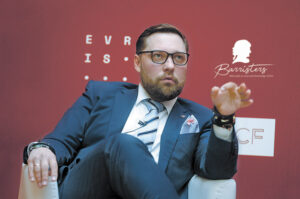
The Verkhovna Rada adopted in the second reading and as a whole draft law No. 13200 ‘On Mentoring,’ which introduces the institution of individual and corporate mentoring for children aged 10 and older and young people from vulnerable groups.
As explained by the relevant committee, mentoring currently covers a very narrow circle of children, and there is a lack of clear mechanisms for organising mentoring – from the selection and training of mentors to support, accounting and control. The new law is intended to expand the circle of mentoring recipients and standardise procedures.
The document provides for two forms of mentoring – individual and corporate, establishes requirements for mentors (in particular, age 21 and Ukrainian citizenship), launches a social service for organising mentoring and defines the entities that organise and control the process. Mechanisms for accounting, monitoring, support and state supervision in the field of mentoring are also being introduced.
According to information from the materials for the second reading, an age threshold of 10 years has been set for children, and the mentoring agreement is to be tripartite: mentor, parents or legal representatives of the child and social service provider. Mentoring is only possible with the consent of the legal representatives and the child themselves.
Commenting on the adoption of the law to Interfax-Ukraine, lawyer Oleksiy Shevchuk emphasised the novelty of the mechanism for older children.
‘The key point is that it is not necessary to establish guardianship or custody for children aged 10 and older,’ he said.
The law will come into force after it is signed by the president and officially published in accordance with the established procedure.
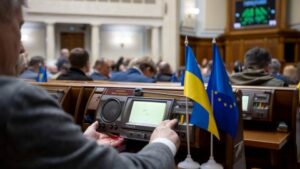
Ukrainian banks will pay income tax at a doubled rate of 50% in 2026.
The corresponding law (No. 14097) on amendments to the Tax Code of Ukraine regarding the specifics of income tax for banks in 2026 was adopted by the Verkhovna Rada on Wednesday with 272 votes in favor, with a minimum of 226 votes required, according to a correspondent from the Interfax-Ukraine news agency.
According to Yaroslav Zheleznyak, first deputy chairman of the relevant parliamentary finance committee, banks will pay tax at this rate on a quarterly basis next year and in the first quarter of 2027, which should bring an additional UAH 15-23 billion to the budget in 2026 and about UAH 5 billion in 2027.
This is the third tax increase for banks to 50% since the start of Russia’s full-scale invasion, but the first two times — in 2023 and 2024 — the Rada made this decision retroactively in the fall.
At its meeting on October 30, the Financial Stability Council (FSC) noted the systemic risks that could be created by the introduction of a 50% tax rate on bank profits from 2026.
“Raising the tax rate for banks to 50% creates risks of limiting lending to the economy and weakening financial stability in wartime,” the FSC emphasized.
Council members also noted that the expected fiscal effect of raising the rate to 50% may turn out to be significantly lower than publicly communicated estimates.
Among other risks, the FRS cited possible complications in the privatization of banks with state ownership, failure by some institutions to implement capitalization programs within the specified time frame, difficulties in timely compliance with capital adequacy requirements in accordance with EU standards, the risk of violating the obligations under the Memorandum with the IMF, as well as a reduction in incentives to de-shadow the economy.
The National Bank also noted that banks and financial companies already have a higher level of income taxation compared to other sectors of the economy – 25% versus 18%.
According to the NBU, Ukrainian banks earned UAH 131.7 billion in net profit in the first 10 months of 2025, which is 4.9% more than in the same period of 2024, and paid 2.1% more income tax – UAH 34.7 billion.
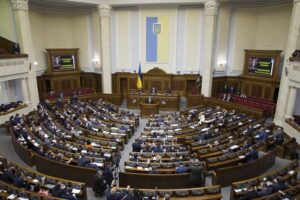
The Verkhovna Rada has recognized the results of education received by Ukrainian citizens abroad, MP Yaroslav Zheleznyak (Voice faction) said on Telegram. According to him, the relevant law No. 12375 was generally supported by 282 MPs at the plenary session of the Verkhovna Rada on Wednesday.
The MPs amended Article 6 of the law “On Complete General Secondary Education”.
The law formalizes the right of Ukrainian citizens to recognize the results of their formal and/or non-formal education in educational entities located abroad (except for the state recognized by the Verkhovna Rada as an aggressor or occupying state).
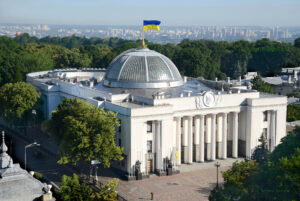
Norway allocates another €5.6 million to support nuclear safety and decommissioning activities
With the ratification of the framework agreement of the International Cooperation Account for Chornobyl (ICA) by the Ukrainian Parliament, the international community and Ukraine are ready to enter a new stage of cooperation on long-term nuclear safety and decommissioning, with a special focus on the Chornobyl NPP. In June 2024, the Rada approved the relevant law, which paves the way for a wider range of nuclear safety activities to be managed by the RSC.
To reaffirm its unwavering support for international efforts for decommissioning and nuclear remediation in Ukraine, at a recent meeting of the PFDR Donor Assembly, Norway announced an additional €5.6 million contribution to the PFDR.
Donors also agreed on the next tranche of funding for projects to improve the safety of spent fuel storage and optimize liquid radioactive waste management at the Chornobyl NPP.
Balthasar Lindauer, Director of the EBRD Nuclear Safety Department, said: “Russia’s military occupation of the Chornobyl Exclusion Zone (ChEZ) in March 2022 has not only damaged the infrastructure at the site, but also left a challenging operational legacy for one of the most vulnerable nuclear power plants in the world. The EBRD has a long-standing commitment to supporting the decommissioning and safety of Chornobyl, and we are determined to ensure that the significant progress made over the years through international cooperation is not lost. The ratification of the framework agreement, additional donor support and commitments to a new tranche of projects are an important statement of this renewed international support for safety at Chornobyl.”
The RMCS was established in November 2020 by the EBRD at the request of the Government of Ukraine. It was established as a multilateral fund to support the development of a comprehensive plan for Chornobyl. After the occupation of the ChEZ at the beginning of Russia’s full-scale war against Ukraine, the RMSF’s scope of tasks was expanded to support the restoration of safety in the ChEZ, as well as broader nuclear safety measures throughout Ukraine.
AGREEMENT, CHORNOBYL, international cooperation, VERKHOVNA RADA

Verkhovna Rada Speaker Ruslan Stefanchuk has signed a decree on the admission of journalists to the parliament building under martial law.
According to the press service of the Verkhovna Rada, the decree allows media representatives to cover the activities of parliament directly in the premises of the legislative body.
The order approves the regulation “On accreditation of media at the Verkhovna Rada of Ukraine of the ninth convocation for the period of martial law in Ukraine”.
Stefanchuk and the head of the parliamentary staff Vyacheslav Shtuchny met with journalists and informed them about the peculiarities of media work in the press center of the Verkhovna Rada, in particular, about actions during the announcement of an air alert. The media representatives were shown the simplest shelter of the parliament building, where they will be obliged to go down during an air alert.
Stefanchuk said that despite the restrictions during martial law, it is important for journalists to be able to cover the activities of the legislative body. He also informed that given the need to comply with security requirements, a maximum of 30 people can work in the press center.
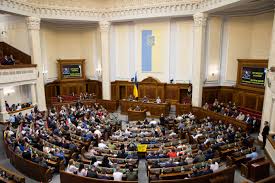
The Verkhovna Rada of Ukraine has adopted as a basis the bill №9083, providing for deregulation and detenization of the market of trade in used vehicles, said the head of the Verkhovna Rada Committee on Finance, Tax and Customs Policy Daniil Hetmantsev.
“Verkhovna Rada adopted as a basis the bill №9083 the initiator of which I am,” he wrote in his Telegram channel on Tuesday.
Getmantsev recalled that the market of used cars before the war was 1.7 million cars per year, in 2023 – 780 thousand.
“This year we expect 1.5 million and only 2.5% of this is sold in white. From the sale of a car in the “white” the state receives an average of 19.8 thousand UAH. From the sale in the “black” – 0″, – he wrote.
At the same time, the head of the parliamentary Committee reminds that for the work of the “white” market there is a hindrance – the requirement of additional registration of the car on the intermediary “with a bunch of unnecessary certificates”.
“The abolition of meaningless state registration of used cars by the trading organization on itself, even if it buys them as goods for resale – will be a pledge for the withdrawal of the market from the shadow, the expansion of the activities of “white” auto traders and the elimination of schemes by which the budget underpays taxes,” – commented the bill Getmantsev.
As reported, the bill № 9063 on the abolition of state registration of used cars on trade organizations that buy them as a commodity for further sale, registered in the Rada on March 6, 2023.
Among its co-authors are Hetmantsev, MPs Yaroslav Zheleznyak (Golos faction), Maryana Bezuglaya, Yevhen Bragar (“Servant of the People”), Dmytro Razumkov (non-faction).
Official car importers and dealers noted that deregulation of the used car trade market will not lead to an increase in prices, as the official market dictates prices and no one will pay more than a car costs.